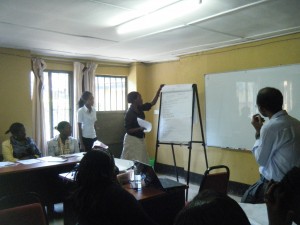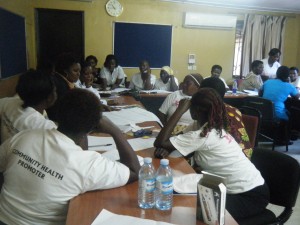
By Miriam Ayesha Khan Kennedy
BRAC’s Disaster, Environment and Climate Change (DECC) programme is currently working with BRAC International to develop the emergency response capacity of 7 BRAC international countries. Our project with Uganda has almost been completed and I recently had the opportunity to travel there to get input and feedback from the local staff and provide some training on the disaster management systems we are trying to implement.
Essentially, we would like to reach a stage where BRAC is able to respond quickly and effectively after a disaster to support the communities it works in (and ideally, in the long-term to be involved in more proactive projects on disaster risk reduction but that’s more of a personal ambition than anything to do with this project). In Bangladesh, basic relief support is something BRAC has been involved with since its very beginning. We’re starting to realise that as our programmes grow in other countries, we may be able to offer the same kind of support internationally and, more importantly, we may be at a stage where we have a moral obligation to do so.
One of the biggest obstacles I initially faced when in Uganda (and even at times in the head office) was the preconception that humanitarian aid and emergency response is not what BRAC does and we don’t have the necessary time and resources to dedicate to it. I think there was a general feeling that initiatives like this will only work in Bangladesh where we’re very well established and have infiltrated nearly every aspect of life.
BRAC is the largest NGO in the world but it is also – and there seemed to be a lot less awareness of this – the largest NGO in Uganda. Why does that matter? Well, if other NGOs in Uganda manage to respond to disasters effectively when called upon, then why isn’t BRAC able to do this too?
We faced similar concerns from the local government and current committees and working groups on disaster management; BRAC is not very well-known and its capacity is consistently underestimated. If our staff do not understand the impact BRAC is having, then how can we expect any different from key stakeholders?
In fact BRAC is operating in every district in Uganda, working with more people than any other microfinance institute and reaching over 10% of the total population with a combination of eight programmes. That adds up to a huge amount of capacity to respond in times of disaster and offer support to local government and other agencies when needed. Given training and a clear system for how to co-ordinate when a disaster strikes (the main outcomes of this project), BRAC Uganda has significant potential to play a key role in disaster response.

Ironically, once the initial mental hurdles had been overcome, much of the feedback from the training sessions with BRAC management, school mentor teachers and health volunteers was that we should be aiming to do more on disaster management and there were many excellent ideas for initiatives that go beyond the scope of this project. By the end of the week, the comments were overwhelmingly positive and several of the training participants were requesting more training on how they can be active in their communities on disaster risk reduction.
If BRAC is going to take on a bigger role in disaster management internationally, we need the full support of our international staff and wider recognition in the humanitarian community. There’s clearly a lot of capacity in our international countries – so how do we make sure they don’t sell themselves short?
Miriam Ayesha Khan Kennedy is a senior manager with the BRAC Disaster Environment and Climate Change programme.